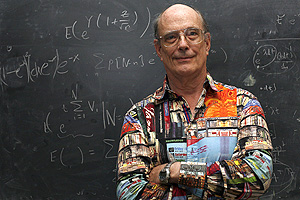Michael Wichura, Associate Professor in Statistics and the College
By Steve Koppess-koppes@uchicago.edu
News Office
 Michael Wichura | |
Michael Wichura recalls a talk in the 1960s, for which hundreds of mathematicians jammed into a Columbia University lecture hall to hear how a graduate student had solved a famous and longstanding mathematics problem.
“This was a really big problem that he had solved,” said Wichura, Associate Professor in Statistics and the College. “Halfway through the talk, somebody said, ‘Why can you interchange the order of integration there?’”
The student’s adviser then stood up and walked out of the room. The order of integration could not be changed, and the student had not solved the problem. “Major egg in the face,” Wichura said. A 2008 Graduate Teaching Award recipient, Wichura shares this story with students today.
“It makes students appreciate the scope and the limitations of the various theorems that we’re studying. ‘Who cares about that?’” he asks them. “You do. You don’t want egg in the face.”
Wichura teaches the first two quarters of the Statistics Department’s core sequence in probability and measure. His students come mostly from Statistics, with a sprinkling drawn from Computer Science, Economics and Mathematics.
“I always strive for the clearest, most elegant, most insightful approach to the subject at hand. Usually that means I end up writing my own notes,” Wichura said.
The considerable time that Wichura invests in his notes have become something of a legacy. James Fill, Ph.D.’80, still uses modified versions of Wichura’s notes in his own classes. “Mike’s notes on measure-theoretic probability form the best graduate-level text in existence on the topics they cover,” said Fill, Professor of Applied Mathematics and Statistics at Johns Hopkins University.
Fill praised Wichura as “the ideal dissertation adviser.” Wichura would guide Fill when the latter became stuck on a technical point, but in a way, that allowed Fill to see the solution on his own.
“As an adviser of several Ph.D. students over the years myself, I have realized how delicate the process of dissertation advising can be, and I have always kept Mike’s shining example in mind,” Fill said.
Probability theory at the graduate level is a realm of sigma-fields, measurable functions and other highly technical concepts. The strong law of large numbers states that tossing an evenly weighted coin a large number of times will produce heads nearly half the time.
“How do you actually prove that that’s what actually goes on?” Wichura asked.
Students develop estimates of the probability that for any given number of tosses, the fraction of heads will, from that point on, never deviate from one-half by more than a certain amount, and show that the probability tends toward zero as the number of tosses mounts toward infinity.
“I try to emphasize the intuition behind the ideas and then show them how they can translate that intuition to mathematics,” Wichura said.
It is demanding, technical work.
“If you fall asleep one week, you’re lost for the rest of the quarter. I work the students hard by having them do daily problem sets that help them master and explore the ideas and stretch their minds. Somehow, they survive,” he said.
Wichura counts himself fortunate to have had dozens of good teachers throughout his education, including Ronald Schaufele, who introduced him to probability theory at Columbia. “His lectures were always very clear and entertaining and showed his love for the subject,” Wichura said.
Two works of Oriental arts and crafts decorate Wichura’s Eckhart Hall office, gifts from former students. His bicycle leans against one wall, symbolic of his passion for riding and his willingness to go the extra mile as a teacher.
“Mike has had a lasting positive impact on my professional life,” Fill said. “I will never be able to repay the debt of his advising me through my dissertation.”
![[Chronicle]](/images/sidebar_header_oct06.gif)